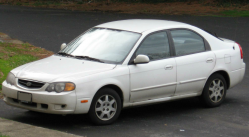— A Kia Sephia brake pad and rotor class-action lawsuit concerning 1997-2000 Sephia cars has finally been approved 17 years after the original lawsuit was filed.
Plaintiff Regina Little purchased a new 1999 Sephia, but within two weeks the brake problems kicked in and for the next three years she allegedly had to replace the brake pads and rotors every six to seven months.
According to the lawsuit, the brake pad and rotor problems are caused by too much heat from friction, prematurely wearing out the rotors and pads. The plaintiff claims a design defect in the Sephia's front brake system doesn't allow heat to dissipate, causing the brakes to shake, grind and vibrate.
Owners complained about constantly replacing the pads and rotors just for the same problems to shortly reappear.
Typically, brake pads will last 20,000 to 25,000 miles before needing replacement, but Kia managers testified under oath the Sephia cars were an exception, including Kia's Deputy General Manager Young Sun Sohn who said the Sephia brake pads were meant to last just under 12,500 miles.
Senior Vice President of Fixed Operations Lee Sawyer testified, "Some of the Sephia owners were experiencing brake pad life in the [ten] to [twelve thousand] mile range." The lawsuit also references a study from Kia that showed the 1999 Sephia had a brake pad life of 16,000 miles.
The Sephia brake problems are so bad that data shows the warranty claim rate nationwide for 1997 Kia Sephias was 92 percent.
Starting with the 2002 model year car, Kia replaced the Sephia with the Kia Spectra, "the same basic car" but with a different brake system.
In August 2003, the court granted class-action certification and following a month-long trial, the jury returned a verdict in June 2008 finding Kia had breached warranty laws. The jury awarded each affected Sephia customer about $750 each in repair damages. However, nothing was awarded based on a loss of vehicle value.
Then the trial court determined repair damages couldn't be awarded to all affected owners because damages couldn't be estimated due to factors that affected each individual owner and their car.
The court left the verdict in place but dropped the damages award and decertified the class-action status, ordering a new trial on repair damages only. From there repair estimates would proceed based on claim forms submitted by Sephia owners.
A new special master was appointed and in 2015 determined only 150 Sephia owners who filed claims had proven their damages and those owners would receive about $46,000, for all of them. But Regina Little, the original plaintiff, would get nothing because the special master concluded she didn't qualify.
Then came January 2015 when attorneys for Kia owners requested $6.1 million in attorney fees and $481,850 in costs even though all Sephia owners combined were receiving just $46,197.
In May 2015 a new judge dropped the attorney fee award "based on the paucity of damages it recovered" and ordered Kia to pay: "$200,000 for class member attorney fees, $19,113 in prejudgment interest, $481,850 in fees and costs of suit."
The judge also ruled $5,000 would be paid to Regina Little as an incentive award since she was the Sephia owner who filed the lawsuit 14 years before.
The end finally arrived when the case was appealed from the Superior Court of New Jersey, Law Division, to the Superior Court of New Jersey, Appellate Division. The Appellate Court said it ruled to reinstate the original jury award based on "recent case law unavailable to the trial judge."
The case is Regina Little, et al., v. Kia Motors America, Inc.
CarComplaints.com has owner-reported complaints about the Kia Sephia, Kia Spectra and other Kia models.

